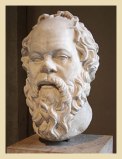My “day job” at a small university is part administrative, part teaching, part assessment, and largely tutoring in writing. The last of these requires a peculiar balancing act, because my directive says I must not tutor discipline content; I have to tutor students toward “clear expression” while staying within the areas of grammar, spelling, vocabulary use, assignment interpretation, thesis writing, paper structure, and documentation. As a job description, that all sounds quite clearly delineated and objective enough, but writing well cannot happen when the writer fails to understand content material. Enter the Philosophy paper.
In any discipline, it’s difficult to separate tutoring “clear expression” in terms of grammar and vocabulary without also tutoring content. With philosophy that process is especially challenging, because to a large extent, philosophical understanding (content) relies on grammar (rhetoric). A student can contradict himself simply by neglecting to type the word “not” in a sentence, rendering his attempt at argument void. Or a student may announce she will use one approach to prove her claim and then prove the claim, quite adequately, with a different (and opposite!) approach.

This bust resides in the Louvre, and was found here: http://www.humanjourney.us/greece3.html
Cases like these cause me to ponder. How can I coach the writer without offering a content-based answer? Philosophy itself supplies the method: inquiry.
“So, you say here that because Locke believed in Natural Law, he would not apply Natural Law in the case of the social contract. Can you explain that statement? Because it seems as though you are contradicting yourself, unless you accidentally added the word ‘not’ or unless you have more to say after this sentence…maybe, why he would not do so?”
“Here, you do a pretty good job explaining why beauty is in the eye of the beholder, although you need to pay more attention to your use of the comma. But back at your claim in paragraph one, you say you will prove beauty is transcendent–and your definition of transcendent doesn’t work with your argument in paragraph three…do you mean beauty is not transcendent? Did you forget a word, or are you missing a paragraph of explanation?”
When the science students or economics students bring papers to me, it is, I admit, much easier for me to stick to grammar and mechanics. The same sorts of logical structure or argument issues crop up, however. Sometimes, I feel as though I am right on the borderline, and sometimes I think I’ve teetered a bit too far into content tutorial–especially when the students are writing about history, philosophy, literature, or philosophy. Yet would any philosopher disagree that you cannot completely disentangle grammar logic from any other kind of logic? They stem from the same root.
This is smart. Too many people seem to think it’s possible to teach writing in a contentless way, but writing is thinking, and the content of the thought can never be separated out entirely.
LikeLike
Anyone who teaches writing–like you!–understands that writing is thinking and that you have to comprehend the concepts about which you are writing. “Education” that ignores cross-discipline synthesis starts with the flawed premise that it is possible, somehow, to segregate learning into specialized content areas. Argh.
LikeLike
Clever note…
LikeLike
I worked in a Writing Center for years (first as a grad student in music, then as a grad student in English), and frequently came up against the same problem. Writing IS thinking. Help with writing SHOULD BE help with critical thinking. Even in the lit classes I’m teaching at the moment, I work on writing, because often I get the impression that the students were trying to make a different point than they’re actually making because they didn’t know how to write their real point. Or they allow their words to run away with them, writing something because it sounds good or they’ve heard someone say something similar, and then when I ask them if they really mean ____ (rephrased), they say “Oh, no, I didn’t actually mean that.”
LikeLike
Often, I ask “What are you trying to say here?” Then I get my pen ready and write down exactly what the student replies. Nine times out of ten it makes tons more sense than what got onto the page.
Then there’s that tenth time…. 😉
LikeLike
Wonderful post and discussion that reminds me of teaching freshman English as well as a critical reading and writing course required for all Education majors. The critical reading and writing course was a bit frustrating as the college of Education required it but wanted the English department to teach it, rarely agreeing with our approach, which was that writing is thinking. And on it went….
I really like your approach of asking the student to state what the point is. I used a similar approach but I did not think to write down the reply. As I have said, the students you assist are quite fortunate.
Karen
LikeLike
We have a similar course in critical reading and writing, but it is not required for Education majors–merely “suggested.” That course is also “suggested” for freshmen whose SAT Verbal scores are low; few students enroll in the class, which is a shame because MOST entering freshmen desperately need to learn how to read, annotate, analyze, and summarize.
An Education professor does teach the course, though!
LikeLike
[…] of that information, and to assess the impact of behaviors and actions and catastrophes and deaths. Socrates, the irritating questioner, required of human beings that capacity of reflectiveness. Solomon […]
LikeLike